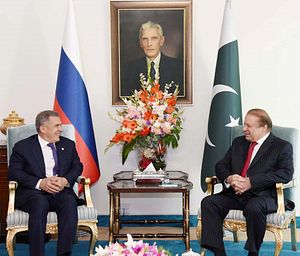The president of the Republic of Tatarstan, Rustam Nurgaliyevich Minnikhanov, paid a visit to Pakistan from March 18-19, visiting Lahore and Islamabad. This was the first official visit undertaken by a leader from Tatarstan, a republic in western Russia, to Pakistan. Minnikhanov’s delegation also included Tatarstan’s Deputy Prime Minister Albert Karimov; Alexey Dedov, Russia’s ambassador to Pakistan; Taliya Minullina, chief executive of the Tatarstan Investment Development Agency; and Marat Gatin, deputy director of foreign affairs of the Republic of Tatarstan.
During meetings, the chief minister of Pakistan’s Punjab province, Shahbaz Sharif, shared his vision of development and public services with the president of Tatarstan. Both leaders wish to cultivate trade and economic relations between Pakistan and Tatarstan. Sharif pointed out that the China-Pakistan Economic Corridor (CPEC) offers new opportunities to expand relations with the Russian republic.
For Pakistan, developing ties with Tatarstan would mesh with similar efforts to foster ties beyond Central Asia. Pakistan sees an opportunity in inviting landlocked Russian republics to take advantage of the benefits of CPEC, which offers access to both resources and connectivity under the broader Chinese “One Belt, One Road” (OBOR) initiative. By the same token, Pakistan has been developing relations with Belarus, with both countries having exchanged high-level visits. Pakistan fostering ties with Russia (including Russian republics such as Tatarstan) and former Soviet states like Belarus would create new regional geostrategic dynamics. If these potential partners join CPEC and OBOR, it would offer an alternative to the Shanghai Cooperation Organization’s Central Asia-heavy perspective on connectivity and trade.
India fears that Pakistan’s thriving ties with the Russian Federation under the CPEC and OBOR framework will upset regional balance, which currently favors India. U.S. withdrawal from the region would further tip the scales in favor of China and the Russian Federation; Pakistan has been cultivating strong defense, economic, and trade ties with both partners. Although the international media did not pay much attention to Minnikhanov’s visit to Pakistan, one cannot deny the significance of his visit in the larger perspective of the SCO, OBOR, and CPEC.
While welcoming Minnikhanov on March 19 in Islamabad, Prime Minister Nawaz Sharif said that Pakistan is pursuing a peaceful neighborhood policy and wishes to resolve all outstanding issues with its neighbors through dialogue. The prime minister reiterated his resolve to establish a strong partnership between Pakistan and the Russian Federation in all fields, as this cooperation would positively contribute to promoting peace and stability in the region.
“Pakistan remains confident that its longstanding partnership with the Russian Federation as well as with its Muslim regions, including the Republic of Tatarstan, would witness significant progress in all areas of mutual interest,” he said.
Prime Minister Sharif visited Tatarstan in 1999, before his first term was cut short by a coup at home. At that time, Minikhanov was prime minister. Sharif invited Tatarstan auto manufacturers to assemble cars in Pakistan, but the offer never came to fruition because of the sudden dismissal of the Sharif government on October 12, 1999.
On this particular trip, Minnikhanov also brought with him Russia’s vision for fostering strong ties with the Islamic bloc against the Islamophobia of the West. Historically, there were strong connections between the Arabs and the Tatars, particularly in medieval history. Minnikhanov was on a mission to revive that splendid relationship according to present day needs and emerging geostrategic compulsions. He did not address the topic openly but the subtext was easily interpreted by analysts. Before embarking upon his visit to Pakistan, Minnikhanov visited Saudi Arabia. His meeting with Saudi Arabia’s King Salman emphasized the integrity of the Islamic bloc in the age of terrorism and militancy, a theme that also echoed through his visit to Pakistan.
With the abundance of natural resources and economic dividends to be gained, it would be high promising to develop strong economic relations between Pakistan and Tatarstan. As Minnikhanov’s trip made clear, doing so would also promote the cause of Muslim integration.
Dr. Ahmad Rashid Malik is a Senior Research Fellow at the Institute of Strategic Studies Islamabad. He is an expert on Japan, China, and the Koreas.

































